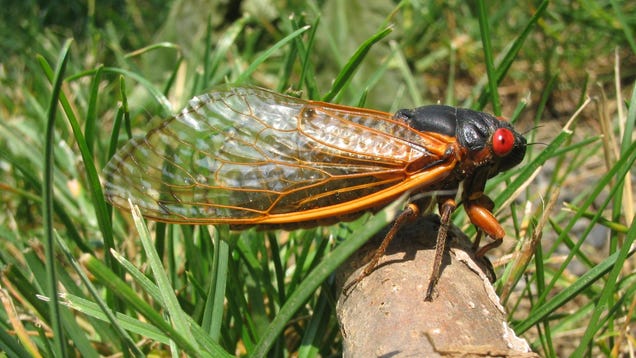This summer much of the American midwest will be subject to the hatching of 13-year cycle Brood XIX and 17-year cycle Brood XII cicadas as an estimated billion plus of the annoying insects jump to life. This monstrous legion will swarm the countryside, largely focused on Illinois, Missouri, and Georgia, with patches expanding into fourteen other states stretching from Texas to Maryland. There are many ways these bugs can mess with your automobile, and it’s best to be prepared ahead of time. They won’t exactly attack the city like Mothra, but they can still cause some damage. Whether you’re running into a swarm of them at speed or they’re burrowing into your filters, here’s what you need to know.
Krispy Kreme’s Q1 beat driven by heart donuts
Hitting Cicadas
There are four major points to note if you run headlong through a big bunch of cicadas, or even encounter just a few. There could be visibility issues, paint damage, clogged radiator grilles, or they could even hit you if you’re driving with the window down.
What’s the last thing going through a cicada’s mind when it hits your windshield? It’s abdomen. A cicada plastered across your windshield could cause some serious visibility issues, especially if you smack the wiper stalk with your windshield washer fluid reservoir bone dry. Make sure you keep the washer fluid topped up and carry a spare gallon with you just in case. Clean your windshield with the little squeegees at the gas station every time you stop for a fill up. Cicadas aren’t heavy enough to cause cracks or chips, but they could exacerbate existing cracks, so make sure they’re taken care of.
If you get cicada guts on your car’s paint, which is nearly an inevitability, try to get it off as soon as you can. Ideally you want to wipe that stuff off of there before it dries. Wash your car as often as you need to this summer, I guess. Mirrors and bumpers will get the brunt of the damage. Cicada guts are acidic and can cause lasting paint damage if left unchecked for too long.
If you hit enough of these damn things, you could begin to see some overheating issues with reduced airflow across the fins of your radiator. If you have a fairly open grille you may want to consider putting some mesh behind it to catch the bugs before they impact the radiator itself. If the grille is already a tight mesh, you’ll want to make sure you’re cleaning it out pretty often.
During the last big cicada swarm, an Ohio man claimed a cicada flew into his car through the open window and struck him in the face. Whether through surprise or distraction or simple freaking the hell out, the man subsequently drove his car into a telephone pole at speed. Maybe use the air conditioning this summer if you’re in prime cicada areas.
Burrowing Cicadas
These bugs are always looking for nice comfortable places to burrow, a AAA spokesperson told NBC 5 Chicago, cabin filters and engine air filters “can become a playground for cicadas.” They recommend periodically listening for unusual sounds emanating from the filter housings. Clear them out as necessary, or if you don’t want to touch bugs, you can send your car to a service shop.
Be careful this summer and try to keep your car nice and cicada-free. Keeping a cool head in the face of a massive bug invasion could save you thousands of dollars or even a trip to the hospital. Good luck.
A version of this article originally appeared on Jalopnik.
>>> Read full article>>>
Copyright for syndicated content belongs to the linked Source : Quartz – https://qz.com/cicada-hatching-car-prep-1851471985










